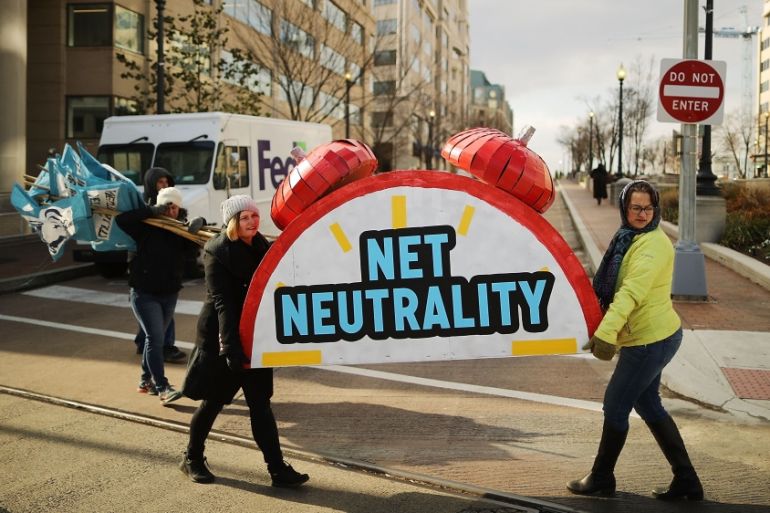#NetNeutrality: US senators force vote for open internet rules
A group of mostly Democrat senators are calling for a vote to overrule the FCC’s decision to repeal net neutrality.

Democratic senators have called for reinstating net neutrality protections and moved to force a vote on the proposal.
A group of senators led by Democratic leader Chuck Schummer and Edward Markey filed a discharge petition on Wednesday, necessary to trigger a vote to overrule the Federal Communications Commission’s decision to revoke protections put in place during the presidency of Barack Obama.
It is not clear when the vote will take place, but advocates believe the Senate will vote before the end of next week.
Proponents currently have the backing of 47 Democrats and two independents, as well as Republican Senator Susan, and they believe they will win on a 50-49 vote.
However, if the Senate manages to repeal the measure, this initiative is not likely to pass the Republican-controlled House of Representatives or to survive a veto by President Donald Trump.
The FCC in December voted 3-2 to reverse Obama-era rules barring service providers from blocking, slowing access to or charging more for certain online content.
The new FCC rules, once effective, would give internet service providers powers to change how consumers access the internet, but include new transparency requirements that require them to disclose any changes to consumers.
The FCC has not yet disclosed when the new rules take effect, but officials have said the commission is likely to give 30-days notice before the changes take place.
The FCC could soon announce the start date.
“The end of net neutrality would be a disaster four our country and the free flow of ideas. But this fight is not over,” Bernie Sanders wrote.
On Wednesday, May 9th, we officially file the petition to force a vote. If you don’t see your Senators on this list, they need to know how you feel about #NetNeutrality TODAY. My resolution will *fully* restore #NetNeutrality & we only need #OneMoreVote to pass it in the Senate. pic.twitter.com/743YFCPkqU
— Ed Markey (@SenMarkey) May 7, 2018
So what is the debate about, here are the key points:
Net Neutrality
-
The term was coined in 2003 by Tim Wu, who is now a law professor at Columbia University. In a 2003 paper, he argued for a nondiscrimination rule that would ensure a level playing field among Internet applications.
- Net neutrality advocates argue that internet service providers (ISPs) should treat all the content moving through their cables in an equal way.
-
ISPs should not be allowed to separate data and slide some of it into “fast lanes” while blocking or discriminating other, as Klint Finley explained.
- Meaning companies should not be able to block or degrade access to websites like YouTube or Netflix, in order to encourage the user to use a different video-streaming service.
-
In 2010, the Obama administration announced regulations that prohibited ISPs from blocking online content, prohibited discrimination, and required more transparency. In 2015, stricter network neutrality rules were approved.
What is #NetNeutrality and why are we on #RedAlert to protect it today?
Watch the video, and visit 👉🏽 https://t.co/lG88pFZIMy pic.twitter.com/8P2jyZ6VS3
— The Web Foundation (@webfoundation) May 9, 2018
Arguments in favour
-
Net neutrality advocates argue that keeping the internet an open playing field is crucial for innovation.
- According to the advocates, without net neutrality consumers will have more difficulty accessing content online and start-ups will have to pay to be able to reach consumers.
-
“Net neutrality is the idea that the internet should be free and open for everyone. If a service provider can block you from seeing certain content or can make you pay extra for it, that hurts all of us and we should have rules against it,” Zuckerberg wrote in July 2017.
- YouTube and Netflix are examples: Had internet providers blocked or limited video streaming, it is unlikely either of those platforms would be available as they are today.
-
Other supporters believe that net neutrality is imperative for free expression. Telecommunications companies would have the power to suppress particular views or limit online speech to those who can pay more.
I invented the web as an open, permissionless space #foreveryone. The FCC’s repeal of #NetNeutrality threatens to take that away. Tell the Senate they must protect net neutrality to keep the web open: https://t.co/B73BzfwMi0 #RedAlert cc @lisamurkowski @SenJohnKennedy @JeffFlake
— Tim Berners-Lee (@timberners_lee) May 9, 2018
The case against
-
Others argue that net neutrality discourages innovation by network owners or it could also discourage investment in infrastructure.
-
According to the critics, internet users might benefit from having the option of paying a premium service ensuring certain services are given priority, and hence encouraging innovation.
- The other argument is that repealing net neutrality will eventually benefit consumers because broadband providers like AT&T could offer a wider variety of service options and that abolishing regulation could end up encouraging investment in network infrastructure.
-
“We are helping consumers and promoting competition,” Pai, Trump’s appointed FCC chairman and one of its strongest advocates, said. “Broadband providers will have more incentive to build networks, especially to underserved areas.”
- Other economists argue that paid prioritisation is normal in the current global economic system. Users who need a better internet can pay for it, while those who are satisfied with the existing service can pay less.